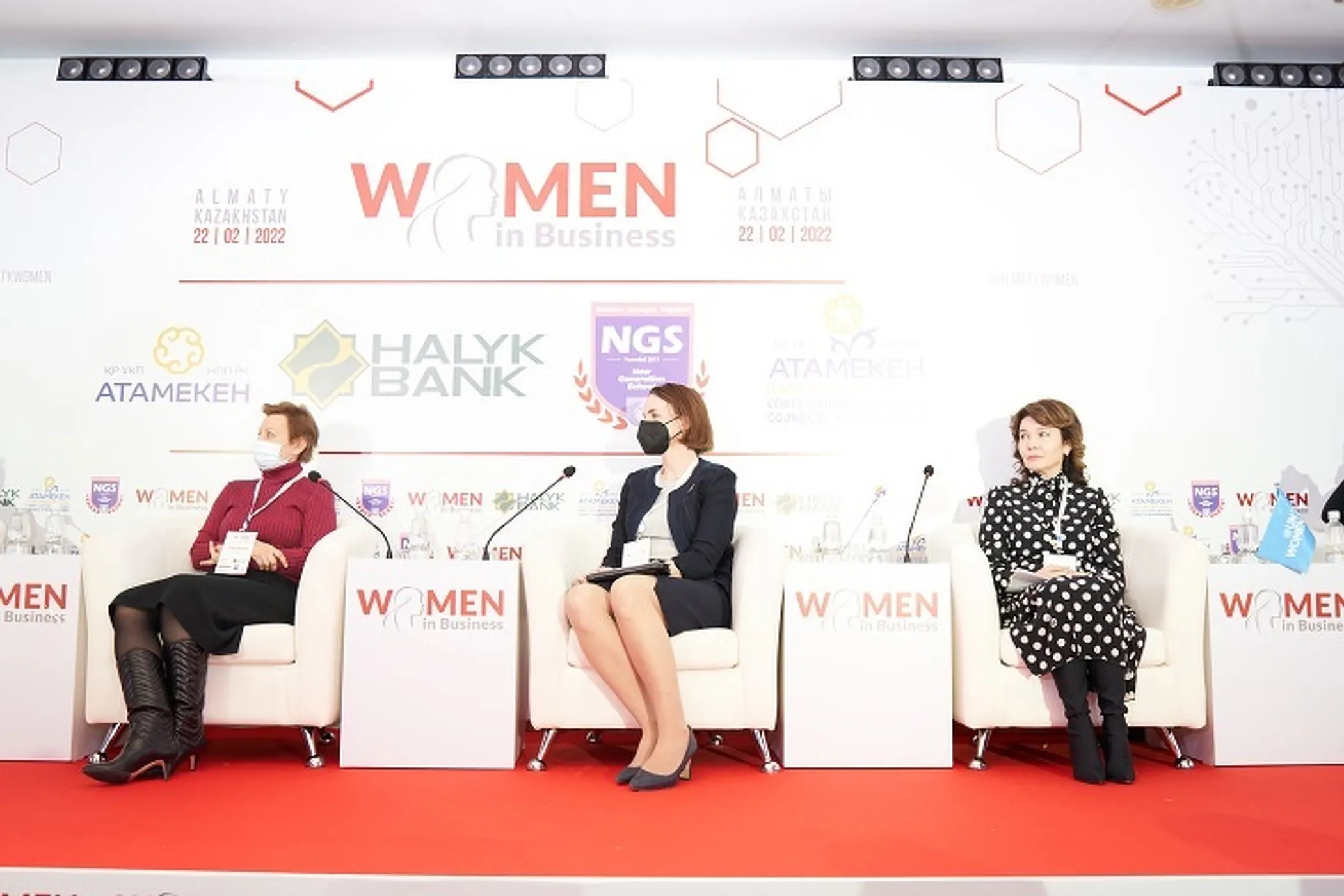More than a hundred business women gathered for the third Woman in Business forum, which, after a two-year break, took place offline in Almaty on February 22. Participants included entrepreneurs from various sectors of the economy, including finance, pharmaceuticals, HoReCa, education and retail. The panel session featured speakers such as Caroline Savage, US Consul General in Almaty; Maria Dotsenko, Head of the UN Women Country Office in Kazakhstan; Elena Bakhmutova, Chairman of the AFK Board; Umut Shayakhmetova, Chairman of Halyk Bank; Lyazzat Ramazanova, Member of the Majilis and Chairman of the National Commission on Women's Affairs and Family and Demographic Policy; and Saltanat Abdikarimova, Managing Director of the National Contest Organization at Atameken.
The good and the bad
The first session was started by Elena Bakhmutova, who had both bad and good news on the topic of gender equality.
On the one hand, the role of women in management and their share among company owners is undoubtedly growing. For example, globally, the number of women in top management has increased from 25% to 31% in five years (2017-2021); 90% of companies have at least one woman in management, in 2017 there were 66% of such firms. Kazakhstan is not too far behind in this regard: the country scored 100 on the Women, Business and the Law index in the "movement and ownership of property" category, with an overall country score of 69.4 (Belgium, Denmark and Sweden scored 100 out of 100).
Worse: a total of 740 million women in the world are employed in the shadow economy, their incomes fell by 60% during the pandemic, and 20% of women lost their jobs during this period. And overall, women are 19% more likely to be unemployed than men.

There are 7 million working-age women in Kazakhstan, who earn on average 25% less than men, said Bakhmutova, but she immediately sweetened the pill: - In 2010, women earned 66% of men's salaries.
In Kazakhstan there are 24% of companies owned by women, 30.5% owned by women, 26% are headed by women. For comparison, in Belarus the figures are 19%, 45%, 21%; in western countries - 14%, 33%, 18%.
But in financial sector, Kazakhstani women feel at home: 8 banks out of 22 are headed by women, every third insurance company is managed by a woman and every fourth on the securities market. Women's prospects on the labor market are more than bright.
Futurologists say that in the next 10 years, health care, education, housing and food, finance, and the arts - the things women traditionally do - will be in demand,"
The head of the AFK even named some of the professions of the future: biohacking specialist, mind-fitness coach, robotics concierge, digital bank teller, science artist.
What needs to be done right now?
"We won't see rapid change, but we need to lay it down today. We need to go back to the roots and rethink them. Almaty is a cultural, educational and financial center, and we need to return it to that status. We must spend money on the development of human capital. Then the level of culture and education will rise, and newcomers will have jobs not at a flea market but in productive employment. Our opportunities depend on our active citizenship,"
Following Bakhmatova, Umut Shayakhmetova, the head of Halyk Bank, stated that she subscribed to every word of her colleague, and added that the main thing now is to improve the mood of domestic investors, to ensure the stability of tax and investment legislation and thereby maintain a favorable domestic investment climate.
The US Consul General Caroline Savage assured the forum participants that not only domestic, but also foreign investors still trust Kazakhstan. She began her speech by expressing her condolences to the families and friends of those who died during the January riots and sympathized with the injured businessmen.
"Many businesses operating in the city and region have suffered at the hands of looters and internet outages, missing out on profits. But it is nice to see how quickly they have reopened to customers and visitors. All of the consulate employees have already returned to Almaty, which speaks volumes about the quick recovery."
"We plan to expand our presence here in Almaty, which is the commercial center not only of Kazakhstan, but of the entire Central Asian region."
According to Caroline Savage, despite the events of January, Kazakhstan has the opportunity to improve its investment attractiveness.
"The U.S. continues to support the reform program announced by President Tokayev, which aims to attract both international and domestic investors, including U.S. investors, to further develop and diversify Kazakhstan's economy."
Supporting the potential of women is not only the right thing to do, but also the smart thing to do. Practice shows that where women flourish, the country flourishes. The more women are involved in economic life, the better for the country. And the promotion of gender equality is a solution to many problems, including the consequences of the pandemic. As the wealthiest country in the region, Kazakhstan is in a good position to develop entrepreneurship."
The second part of the forum were master classes, which covered topics ranging from the protection of the rights of entrepreneurs to the mental well-being of a businesswoman. Woman in Business was organized by the National Chamber of Entrepreneurs "Atameken" with the support of the Kazakhstan Press Club.










